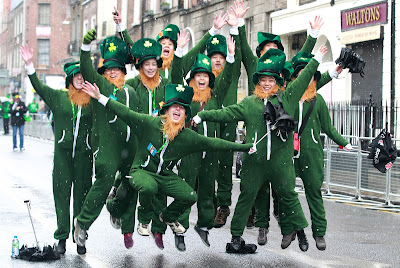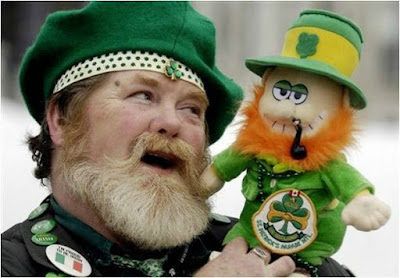Saint Patrick’s Day is a cultural and religious holiday celebrated on 17 March. It is named after Saint Patrick (c. AD 385–461), the most commonly recognized of the patron saints of Ireland.
Saint Patrick’s Day was made an official Christian feast day in the early seventeenth century. The day commemorates Saint Patrick and the arrival of Christianity in Ireland, as well as celebrates the heritage and culture of the Irish in general. Celebrations generally involve public parades and festivals and the wearing of green attire or shamrocks.
 History
History
The person who was to become St. Patrick, the patron saint of Ireland, was born in Wales about AD 385. Until he was 16, he considered himself a pagan. At that age, he was kidnapped and sold into slavery. During his captivity he became a Christian and adopted the name Patrick.
He escaped from slavery after six years and went to Gaul where he studied in the monastery for a period of twelve years. During his training he got the notion that his calling was to convert the pagans to Christianity.
He returned to Ireland and was credited with bringing Christianity to its people. Patrick was quite successful at winning converts. And this fact rightfully upset the Celtic Druids, who had their own native religion. Patrick was arrested several times, but escaped each time. He traveled throughout Ireland, establishing monasteries across the country. He also set up schools and churches which would aid him in his indoctrination of the Irish country into Christianity.
His mission in Ireland lasted for thirty years. He died on March 17 in AD 461. That day has been commemorated as St. Patrick’s Day ever since.
There are many myths and legends about St. Patrick. Perhaps the most well known legend is that he explained the Holy Trinity (Father, Son and Holy Spirit) using a native Irish clover, the shamrock. He used the three-leafed shamrock in his sermons to represent how the Father, the Son, and the Holy Spirit could all exist as separate elements of the same entity. His followers adopted the custom of wearing a shamrock on his feast day.
St. Patrick’s Day Around the World
Today, people celebrate St. Patrick’s Day throughout the world, especially in the United States, Canada and Australia. This holiday is also celebrated in many other locations far from Ireland, including Japan, Singapore and Russia.
Approximately 1 million people annually take part in Ireland ‘s St. Patrick’s Festival in Dublin, a multi-day celebration featuring parades, concerts, outdoor theater productions and fireworks shows. Many people dress up in entirely green outfits to celebrate the holiday. One reason St. Patrick’s Day might have become so popular is that it takes place in the beginning of spring. One might say it has become the first green of spring.
Saint Patrick’s Day was made an official Christian feast day in the early seventeenth century. The day commemorates Saint Patrick and the arrival of Christianity in Ireland, as well as celebrates the heritage and culture of the Irish in general. Celebrations generally involve public parades and festivals and the wearing of green attire or shamrocks.
 History
HistoryThe person who was to become St. Patrick, the patron saint of Ireland, was born in Wales about AD 385. Until he was 16, he considered himself a pagan. At that age, he was kidnapped and sold into slavery. During his captivity he became a Christian and adopted the name Patrick.
He escaped from slavery after six years and went to Gaul where he studied in the monastery for a period of twelve years. During his training he got the notion that his calling was to convert the pagans to Christianity.
He returned to Ireland and was credited with bringing Christianity to its people. Patrick was quite successful at winning converts. And this fact rightfully upset the Celtic Druids, who had their own native religion. Patrick was arrested several times, but escaped each time. He traveled throughout Ireland, establishing monasteries across the country. He also set up schools and churches which would aid him in his indoctrination of the Irish country into Christianity.
His mission in Ireland lasted for thirty years. He died on March 17 in AD 461. That day has been commemorated as St. Patrick’s Day ever since.
There are many myths and legends about St. Patrick. Perhaps the most well known legend is that he explained the Holy Trinity (Father, Son and Holy Spirit) using a native Irish clover, the shamrock. He used the three-leafed shamrock in his sermons to represent how the Father, the Son, and the Holy Spirit could all exist as separate elements of the same entity. His followers adopted the custom of wearing a shamrock on his feast day.
St. Patrick’s Day Around the World
Today, people celebrate St. Patrick’s Day throughout the world, especially in the United States, Canada and Australia. This holiday is also celebrated in many other locations far from Ireland, including Japan, Singapore and Russia.
Approximately 1 million people annually take part in Ireland ‘s St. Patrick’s Festival in Dublin, a multi-day celebration featuring parades, concerts, outdoor theater productions and fireworks shows. Many people dress up in entirely green outfits to celebrate the holiday. One reason St. Patrick’s Day might have become so popular is that it takes place in the beginning of spring. One might say it has become the first green of spring.





